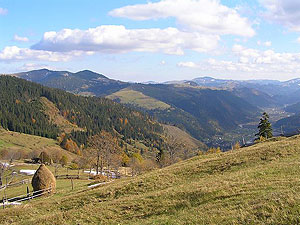- About Ukraine
- The Name of the State
- Geographic Situation
- The Land
- Natural Resources
- The Seas and Inland Waters
- The Climate
- The Flora
- The Fauna
- Administrative and Territorial Organization
- The Population
- Kyiv
- Folk art from Ukraine
- Love Ukraine
- Ivano-Frankivsk region
- Hutsuliya
- Rest and Tourism
- Photograph Album
- Library
- Feed
- Store
Ukraine is situated in two climatic zones — moderate (the plains and both the mountain ranges) and Mediterranean subtropics (the southern shore of Crimea).
Generally, Ukraine is one of the climatically comfortable countries. The number of hours of sunlight varies from 1700 in the north to more than 2400 in the south. The temperatures vary predominantly from the north to the south, in the Ukrainian Carpathians — from the northwest to the southeast. The lowest temperature of January and February is -7... -8°C (on the plains of Crimea — 0°C, on it’s southern shore — up to +3... +4°C). The highest average July temperature is +17... +19°C (north and northwest) and +22... +23°C (south and southeast). In the Carpathians it can go down to +13... +14°C, and to +16°C in the Crimean Mountains.
The amount of rainfall decreases from the north and northwest to the south and southeast. Most of it falls during the warm time of the year (except on the southern shore of Crimea). The highest amount of rainfall is in the Carpathians (1500 mm) and in the Crimean Mountains (1000–1200 mm), whereas the least falls on the shores of Black and Azov seas (300–450 mm), in the western part of Ukraine (600–650 mm) and in the southwest (400–450 mm).
There is a clearly defined change of seasons during the year. The winters are long but relatively warm, with frost and snow. In the Ukrainian Carpathians it lasts 120–130 days, in the north of Crimea — 75–90 and not more than 85 days on in the far south and southwest (influenced by the warm air currents from the Atlantic and the Mediterranean).
Spring starts when the average temperatures cross 0°C, but frosts are still possible. Spring first touches the southwest and Crimea and it makes it’s way north from the south in approximately 37 days.
 Spring in Carpathian mountains
Spring in Carpathian mountains
The summer starts when the temperature reachs 15°C and is warm in most regions, hot in Crimea. The temperatures can reach +34... +39°C when the air currents from Africa reach Ukraine through the Mediterranean. The summer lasts from 120 to 150 days.
In the autumn the temperatures drop and some frosts are possible, the number of rains and fogs increases. Autumn lasts from 70 days in the southwest to 90 days in Zakarpattia. Rarely some very warm periods are possible.
The climate of large cities and seas can differ, in some aspects. For example, in winter Kyiv experiences some cyclones that cause unstable weather. Strong winds happen rarely and the lowest temperatures of -10°C and less fall on January and February. The autumns in Kyiv are predominantly warm, springs — sunny and rainy.
To conclude the weather conditions in Ukraine have positive influence on various industries and development of tourism and recreation.

